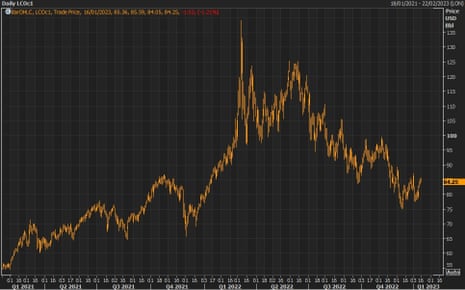Key events
The FTSE 100’s three-year high was on Friday, at 7,864.95 points.
Today’s trading has already come within a whisker of that, at 7,863.51 points.
What would it take to propel the FTSE 100 to a record high today? One possibility is higher oil prices, which would buoy BP and Shell, the index’s two big fossil fuel companies.
But oil prices are down today. Futures prices for Brent crude oil, the North Sea benchmark, are down by 1.3% to $84.10 a barrel, while West Texas Intermediate, the North American benchmark, is down 1.2% at $78.83 a barrel.

Those are still historically very high prices, but notably they are still below the levels of late February 2022, when Vladimir Putin launched the full-on assault on Kyiv that caused prices to surge well over $100 a barrel.
The FTSE 100 has edged up this morning by 0.2% – or about 15 points.
It has been a strong start to the year for London’s benchmark index. It has gained 5.5% in 2023 so far.
At 7,858 points on Monday morning it is within touching distance of its record intraday high. That was 7,903 points set in May 2018, before it closed at 7844.07.
It isn’t all a cheery message: the FTSE 100 has benefited from a weaker pound. But the index has been helped by slowing inflation, which could mean central banks do not need to raise interest rates quite so quickly.
Marks & Spencer to open 20 new stores

Marks & Spencer has said its plan to open 20 new shops across the UK will create 3,400 jobs.
The food and clothing retailer is one of the UK’s most prominent household names – even if it is only a member of the FTSE 250 index of mid-sized businesses. It wants to open eight full-line stores in shopping centres such as the Bullring in Birmingham and the Trafford Centre in Manchester, as well in as retail parks and high streets across key cities.
It also will open 12 new food halls, including in Stockport, Barnsley and the seaside town of Largs in North Ayrshire, Scotland.
The new openings will bring investment in new stores to £480m, M&S said, according to the Press Association.
Stores are a core part of M&S’s omni-channel future and serve as a competitive advantage for how customers want to shop today.
Our store rotation programme is about making sure we have the right stores, in the right place, with the right space and we’re aiming to rotate from the 247 stores we have today to 180 higher-quality, higher-productivity full-line stores that sell our full clothing, home and food offer whilst also opening over 100 bigger, better food sites.
The outperformance of our recently relocated and renewed stores give us the confidence to go faster in our plan.
Household energy bills to remain above pre-Ukraine invasion levels - oil boss
Good morning, and welcome to our rolling, live coverage of business, economics and financial markets.
Household energy prices may remain higher than the levels seen before Russia’s invasion of Ukraine as countries pay for the costs of the green transition, according to the boss of Equinor, one of the world’s biggest energy companies.
Anders Opedal, Equinor’s chief executive, said there will be “more and more normal prices in a couple of years’ time”.
Russia’s full-scale invasion of Ukraine in early 2022 roiled global energy markets, causing wholesale energy prices to surge. Those higher prices were quickly passed on to consumers across the world, causing inflation to accelerate and cutting the amount households have available to spend. However, analysts are hoping prices will fall back.
Yet Europe is going through a “rewiring” of its energy system, with a need for massively increased renewable energy investment, Opedal said in an interview on Monday with BBC Radio 4’s Today programme. The Norwegian state-owned oil and gas company is one of the dominant players in extracting polluting fossil fuels from the North Sea, but it has also invested a relatively small amount in renewable energy.
Opedal said:
We need to do the industry in a totally different way, maybe using hydrogen and so on. This will require a lot of investment and these investments need to be paid for, so I would assume that the energy bills may slightly be higher than in the past, but not as volatile and high as we have today.
We need to treat energy as something that is not abundant. It is actually something that has a lot of value, and we have had a lot of cheap energy in the past. We probably wasted some of it.
It’s a fairly quiet day on the economic data front, but we will bring you more shortly on Marks & Spencer’s plans to hire 3,400 more workers, and controversial sub-prime lender Amigo Holdings’ struggles to raise new investment.

 1 year ago
206
1 year ago
206










 English (US)
English (US)